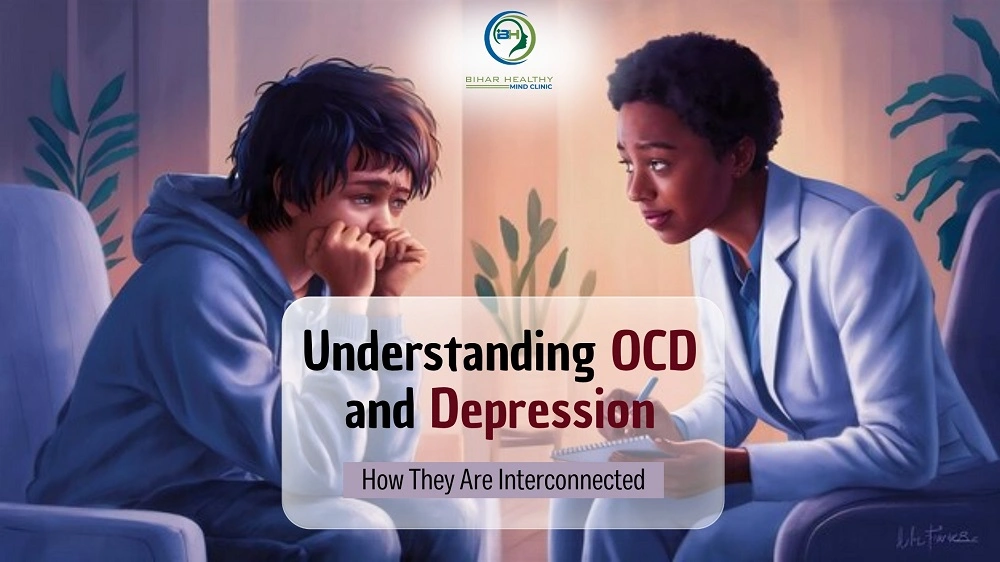
Mental health conditions often exist in complex relationships, and one of the most studied pairings is OCD and depression. Both disorders are serious, chronic conditions that affect the brain’s chemistry, thoughts, emotions, and behaviors. While each has distinct features, research shows a strong link between OCD and depression, as many patients experience symptoms of both.
At Patna Psychiatry, under the guidance of Dr. Saurabh Kumar, MD (Psychiatry), widely regarded as the best psychiatrist in Patna, patients receive holistic and evidence-based care designed to address these interconnected disorders comprehensively.
In this article, we’ll explore how OCD (Obsessive-Compulsive Disorder) and depression (Major Depressive Disorder) are related, what causes this overlap, how it affects one’s mental health, and the available treatment options.
What Is OCD?
Obsessive-Compulsive Disorder (OCD) is a mental health condition marked by unwanted, intrusive thoughts (obsessions) and repetitive behaviors or mental rituals (compulsions). People with OCD often feel compelled to perform certain actions to reduce anxiety or prevent perceived harm, even though they know these actions may not make logical sense.
-
Common examples include:
- Repeatedly checking locks or appliances
- Excessive hand washing or cleaning
- Counting or repeating phrases mentally
- Fear of contamination, symmetry, or causing harm
These compulsions can consume hours of a person’s day and significantly disrupt their personal, social, and professional life.
What Is Depression?
Depression is more than just sadness, it’s a persistent feeling of hopelessness, emptiness, or lack of motivation that can affect how a person thinks, feels, and functions.
-
Symptoms include:
- Persistent low mood or sadness
- Fatigue and loss of interest in activities
- Changes in appetite and sleep
- Difficulty concentrating or making decisions
- Thoughts of self-harm or worthlessness
Depression can be caused by biological factors (such as brain chemistry and genetics), psychological stress, or environmental triggers.
How Are OCD and Depression Related?
The relationship between OCD and depression is both complex and bidirectional, meaning that either condition can contribute to or worsen the other.
1. Shared Neurological Pathways
Both disorders involve imbalances in neurotransmitters, particularly serotonin, which plays a key role in mood regulation and anxiety control. When serotonin function is disrupted, it can lead to obsessive thinking and depressive symptoms simultaneously.
2. Emotional Exhaustion from OCD
OCD is emotionally draining. The constant cycle of intrusive thoughts and compulsive rituals can lead to feelings of failure and helplessness. Over time, this emotional strain can progress into clinical depression.
3. Cognitive Distortions
Individuals with OCD often engage in negative self-talk and guilt. They may feel ashamed of their thoughts or believe they are losing control, reinforcing depressive emotions and low self-esteem.
4. Genetic and Environmental Factors
Family studies indicate that both disorders can run in families, suggesting a genetic link. Stressful environments, trauma, or lack of social support can further increase vulnerability to developing OCD and depression together.
Symptoms of OCD and Depression Coexistence
When both conditions occur simultaneously, symptoms may overlap or amplify, making diagnosis and treatment more challenging.
-
Common overlapping signs include:
- Persistent anxiety and sadness
- Intrusive thoughts with a sense of hopelessness
- Avoidance behaviors
- Fatigue from mental strain
- Difficulty enjoying life or maintaining motivation
The combination can lead to severe emotional distress, increasing the risk of suicidal thoughts if left untreated.
Diagnosis and Assessment
Diagnosing the coexistence of OCD and depression requires a detailed psychiatric evaluation. At Patna Psychiatry, diagnostic assessments involve:
- Clinical Interviews: Understanding the patient’s history, thought patterns, and emotional responses.
- Psychometric Tests: Using standardized tools to measure anxiety, obsessional thoughts, and mood symptoms.
- Medical Evaluation: Ruling out other possible causes like thyroid dysfunction or neurological issues.
Early and accurate diagnosis ensures a more effective and personalized treatment plan.
Treatment Approaches for OCD and Depression
1. Cognitive Behavioral Therapy (CBT)
CBT helps individuals recognize and reframe distorted thought patterns. For OCD, Exposure and Response Prevention (ERP), a form of CBT that gradually exposes patients to anxiety triggers while preventing compulsive behavior.
2. Medication
Selective Serotonin Reuptake Inhibitors (SSRIs) are commonly prescribed to balance brain chemicals involved in both OCD and depression. These medications are carefully tailored to individual needs by psychiatrists.
3. Psychotherapy and Supportive Counseling
Therapy helps patients develop coping strategies, address emotional distress, and rebuild confidence. Family therapy may also be recommended to educate loved ones and reduce stigma.
4. Lifestyle Interventions
Regular exercise, mindfulness meditation, and balanced nutrition can significantly improve mood and reduce anxiety. Patients are encouraged to maintain consistent routines and avoid isolation.
5. Professional Psychiatric Care
At Patna Psychiatry, Dr. Saurabh Kumar and his team provide evidence-based treatment combining medication, therapy, and personalized mental health plans. Recognized as the best psychiatrist in Patna, Dr. Kumar focuses on comprehensive recovery, not just symptom management.
The Importance of Early Intervention
Delaying treatment for OCD depression can lead to chronic distress and impaired functioning. Early intervention allows patients to regain control over their thoughts, emotions, and life. Seeking help from a qualified mental health professional ensures faster recovery and prevents relapse.
Conclusion
The connection between OCD and depression reveals how deeply intertwined our thoughts and emotions are. Recognizing this relationship is the first step toward healing. With proper diagnosis, therapy, and compassionate support, individuals can achieve lasting recovery and lead fulfilling lives.
If you or a loved one is struggling with obsessive thoughts, compulsive behaviors, or persistent sadness, don’t hesitate to reach out to Patna Psychiatry, home to the best psychiatrist in Patna, Dr. Saurabh Kumar, MD (Psychiatry) for compassionate, professional care.
Visitors: 71





No comments yet.